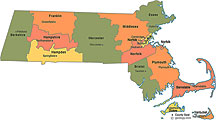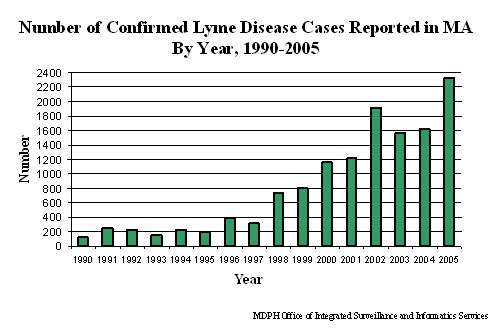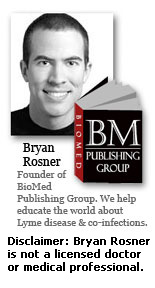Lyme Cases Exploding in Massachusetts
By Bryan Rosner on May 4, 2008 in General News, Geographic Incidence
 The state of Massachusetts (MA) has consistently ranked in the top ten states in the US in reported Lyme disease cases; however its numbers are decidedly on the rise. In 2005, for example, MA ranked 4th nationwide in case numbers with 2,341 reported Lyme cases to the Centers for Disease Control and Prevention (CDC), a 46% increase over 2004 numbers. Nationally, the reported cases totaled 23,305, an 18% increase in numbers.
The state of Massachusetts (MA) has consistently ranked in the top ten states in the US in reported Lyme disease cases; however its numbers are decidedly on the rise. In 2005, for example, MA ranked 4th nationwide in case numbers with 2,341 reported Lyme cases to the Centers for Disease Control and Prevention (CDC), a 46% increase over 2004 numbers. Nationally, the reported cases totaled 23,305, an 18% increase in numbers.
The largest increases in MA were seen in Suffolk, Norfolk, and Middlesex Counties. The majority of confirmed cases had onsets in June, July and August. The average age for a confirmed Lyme disease case was 39 years. The highest reported incidence rates were among children aged 5-9 years and adults aged 60-64 years, and 35% of confirmed cases did not report an EM rash.
As you can see, Lyme disease cases have been sharply on the rise in MA from 1990-2005:

Here is a further breakdown of Lyme cases in MA per county:
| County* (unknown for 16 cases) | 2005 Confirmed Cases (#) | Incidence Rate (per 100,000) |
| Barnstable | 229 | 101.1 |
| Berkshire | 66 | 50.1 |
| Bristol | 148 | 27.1 |
| Dukes | 90 | 577.2 |
| Essex | 254 | 34.4 |
| Franklin | 24 | 33.2 |
| Hampden | 118 | 25.6 |
| Hampshire | 68 | 44.3 |
| Middlesex | 444 | 30.4 |
| Nantucket | 29 | 285.2 |
| Norfolk | 252 | 38.6 |
| Plymouth | 320 | 65 |
| Suffolk | 45 | 6.9 |
| Worcester | 238 | 30.4 |
| State Total | 2341 | 36.3 |
Given that the national average incidence is 8.24, you can see that MA has quite a high number of Lyme cases!
Local MA Resources
Lyme and Tick borne Disease Support Group for Teens on April 29 from 7-9 pm at St. Paul’s Church basement, 50 Union St., Hamilton, MA. The support group is intended for teens ages 12-18. For more information, please contact Kriste or James Brao at runkickski@comcast.net.
CONCORD MA will schedule Support Group sessions the fourth Thursday
of the month. The sessions are scheduled for 7 pm in the Concord Library, 129 Main
St., Concord and are open to those interested in sharing their
experiences, learning more about research and legislation, and
sources of information on the Internet. Contact Rose
at (978) 369-2396 Rose Ruze roseruze@verizon.net
=============
Cape Cod Lyme Support Group
Meets Once a Month on Sunday
(dates vary)
3-4:30 p.m. Church of the Covenant
Satucket Rd. in Brewster
Nancy: nbwood@comcast.net
===============
South Shore Lyme Support
southshorelyme@hotmail.com
Melissa Kerins
617-827-5805
(people are welcome to call me)
May 5 th
Special meeting starts at 6pm
June 2 nd
July 14 th
August 4th These meetings 6:30-7:45 pm
Sept 1st
Oct 6th
Nov 3rd
Dec 1st
Plymouth county
(617)827-5805
Melissa Kerins
The location that the meetings will be held is the community room at:
Whitman Public Library
100 Webster Street
Whitman Massachusetts 02382
==============
For MA Support Contact:
Mimi Winer at
508-358-5013
Worcester County
contact: Dawn at 978-597-2726
dgipa@yahoo.com
Plymouth MA
contact: Janet 508-866-9476
Islington, MA.
contact: Linda at
Linda2lymehelp@aol.com
Massachusetts Lyme Disease Coalition/
Cape Cod Lyme Disease Awareness Association*
John Coughlan
Mashpee/Falmouth, MA
(508) 563-7033
Lower Cape LD Support Group*
Brewster/Chatham, MA
Outer Cape LD Support Group*
Carolyn Tacke
Truro, MA
(508) 487-2720
New Bedford Lyme Support Friends*
Denise Chasse
New Bedford, MA
(508) 979-7859
Westport-Fall River LD Support Group*
Polly Emilitas, Janice Dey & Beth Herosy
Westport, MA
(508) 636-3184
Westwood LD Resource Line*
Maureen O’Brien R.N.
Westwood, MA
(781) 251-2521
Boston Lyme Disease Resource Line*
Kerry Kineavy, RN
So. Boston, MA
(617) 268-3767
Central Mass. LD Family Resource Ctr*
Eileen Johnson
Webster, MA
(508) 943-2692
Western Mass. LD Resource Line*
Marci Linker
Florence, MA
E-Mail: Woodi16@aol.com
Epidemiology and Detailed Information
According to the latest statistics from the MA Department of Public Health, the areas of highest incidence are Cape Cod and Southeastern MA, Nantucket and Martha’s Vineyard, Essex County north of Boston, and towns along the Middlesex and Worcester county border, along the Quabbin Reservoir watershed, and in southern Berkshire County. Recorder.com on July 30 reported that University of MA, Amherst, researcher Steven Rich, who has NIH grant to study ticks in MA, discovered a thriving population of deer ticks halfway up Mount Greylock, one of the coldest areas in the state. ”Deer ticks used to be limited primarily to a 15-mile zone along the coast of New England,” says Rich. ”Now they are moving much farther inland as they seemingly adapt to the cold.”
To understand the ramifications of the numbers, one needs to know that the CDC has indicated that only 10% of the cases that meet its surveillance criteria are actually reported, so that means about 23,410 cases of Lyme disease that met the CDC surveillance criteria occurred in MA in 2005, and 233,050 Americans who fit the surveillance criteria developed Lyme disease nationally. No one is tracking the numbers of cases that do not meet the surveillance criteria, cases that are physician-diagnosed clinically and the ones that most often develop into chronic disease. Estimates range from 10-15 to 40% of Lyme cases develop into chronic disease (cases that have failed a standard treatment course and continue to be symptomatic).
According to the CDC, the average annual incidence in the 10 highest states for the recent three-year period was 29.2 cases per 100,000 population, although the target of Healthy People 2010 was 9.7 new cases per 100,000 in the 10 states , researchers reported. 61% of the cases were children.
During the 2003-2005, CDC figures showed that 93% of the cases (59,770) in the country occurred in 10 endemic states: Connecticut, Delaware, Maryland, Massachusetts, Minnesota, New Jersey, New York, Pennsylvania, Rhode Island, and Wisconsin. Lyme cases per 100,000 population in the 10 states went from 29.1 in 2003 to 31.6 in 2005. From 2003 to 2005, three counties nationally had annual rates above 300 cases per 100,000 population in all three years: Columbia and Dutchess Counties in New York and Dukes County in Massachusetts.
Other tick-borne disease are on the rise in MA and nationally. MA Health Department figures show tularemia, 7 reported cases in MA; babesiosis, cases increased by almost 7 fold since inception of reporting in 1990; and ehrlichiosis, increased almost 5 fold since its 1997 reporting inception. Considering many doctors do not look for these co-infections transmitted by the bite of the Ixodes scapularis (deer) tick that transmits Lyme disease, these numbers should trigger concern among MA officials.
In 2005, the Assembly held two public hearings to address the issue. The first hearing, State House Health Chairman Koutoujian hosted a hearing in Ayer, MA. The LDA was invited to be part of a public panel which heard hours of testimony from state residents on their experiences with Lyme disease. LDA was asked to submit to Mr. Koutoujian a letter containing recommendations to the State of MA (copy included). October 12, 2005, the Joint Massachusetts Legislative Committee on Public Health convened a more extensive hearing in Boston. Over 250 people attended. The LDA was asked to provide a panel of doctor experts whose testimony was followed by hours of citizen testimony. Most testimony was personal stories on Lyme and the inability to be diagnosed or treated and going out of state to get treatment. Many mentioned the lack of a definitive test and also lack of protection for treating physicians, and the refusal of insurance companies to reimburse when they were able to get treatment.
The following are bills introduced in the MA legislature in 2007 (note: LDA to sit on commission in H3883).
In January, H 3768, by Mr. Webster of Hanson, petition of Daniel K. Webster and Cleon H. Turner Promoting education and access to medical care for persons with Lyme disease; No physician is subject to disciplinary action by the board solely for prescribing long-term antibiotic treatment for a patient clinically diagnosed with Lyme disease, if this diagnosis and treatment plan is documented in the medical record for that patient. The department shall provide statewide Lyme disease education for physicians, schools and the general public, promote detection prevention and treatment programs for tick-borne diseases and work with graduate medical and nursing programs and establish an appropriate curriculum. It will perform cost-benefit analyses on insurance coverage of long term antibiotic care for Lyme disease patients; shall promulgate regulations for the lab detection of Lyme disease, for the state of art testing protocol and shall develop clinical provider training programs for the assessment and treatment of tick-borne illnesses.
A public hearing is scheduled for H3768 on September 12. The Chairwoman of the Cape & Islands Task Force named a special subcommittee to discuss this bill, seek input, and provide suggestions to the Health Committee at the scheduled Hearing. This subcommittee meeting will be held on Sept. 6 in Barnstable.
FY 08 Budget Amendments Health & Human Services, EHS 782 COMPREHENSIVE LYME DISEASE STUDY:
Mr. Tarr, along with Mr. O’Leary, moved that the bill be amended, in Section 2, in item 4510-0600, by adding at the end thereof the following: “provided further, that not less than $75,000 shall be expended for a comprehensive study on Lyme disease.”
H3883: To create a special commission to investigate study of Lyme disease − $75,000 Funding. Study shall include the review of costs and benefits associated with(1) establishing a Massachusetts Center for Lyme Disease; (2) conducting a Lyme disease public health clinical screening study in high risk regions; (3) developing education materials and training resources for clinical providers and school health personnel for detecting signs and symptoms of tick borne illnesses in school aged populations. Commission shall provide a report to legislative committees of the results of its investigation along with recommendations, if any, together with drafts of legislation necessary to carry its recommendations into effect no later than February 1, 2008.
(A language change took place circa July 24) The Amendment is now part of H3883 and the Hearing to Fund the Lyme Commission (above) has already been held. Representatives Callahan of Sutton, Hill of Ipswich, Koutoujian of Waltham, Grant of Beverly, L’Italien of Andover, Garry of Dracut, Loscocco of Holliston, Webster of Hanson, Turner of Dennis move to amend the bill by adding the following section:
Representatives Callahan of Sutton, Hill of Ipswich, Koutoujian of Waltham, Grant of Beverly, L’Italien of Andover, Garry of Dracut, Loscocco of Holliston, Webster of Hanson, Turner of Dennis move to amend the bill by adding the following section: “SECTION __. Resolved, that a special commission, to consist of two members of the senate, three members of the house of representatives, the commissioner of the department of public health or his designee, the commissioner of education or designee, the chancellor of the university of Massachusetts medical school or his designee, the director of the state laboratory institute or designee, the state epidemiologist or designee, and three persons to be appointed by the governor, one of whom shall be a representative of the Cape and Islands Lyme Disease Task Force, one who shall be a member of the Massachusetts Chapter of the International Lyme and Associated Diseases Society, and one who shall be a representative of the Lyme Disease Association is hereby established for the purpose of making an investigation and study of Lyme Disease.
HB 1081:The Commonwealth of Massachusetts petition of Theodore C. Speliotis 2007 AN ACT RELATIVE TO LYME DISEASE TREATMENT COVERAGE − mandatory insurance coverage for Lyme disease treatment.








